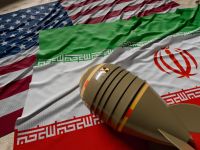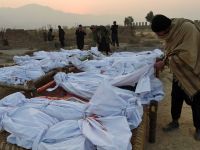As the votes were tallied following Sunday’s second and final round of polling for the Lebanese parliament, the signs pointed toward a stunning victory for the former prime minister, Rafik Hariri, defeat for the sitting prime minister, Salim al-Hoss, and a slap in the face for the country’s president, Emile Lahoud.
Lahoud, a former army commander installed by Syria in 1998, appeared determined to foil any comeback attempt by Hariri but it now appears that Hariri can amass a large enough bloc in parliament to reenter his former office. Furthermore, Syria, which maintains 30,000 troops in the country and exerts a critical influence on local politics, may consider him the sole figure capable of extracting Lebanon from its deepening economic crisis. Syria, it should be remembered, is greatly dependent upon the state of the more developed Lebanese economy.
Roughly 1.4 million voters from Beirut, the eastern Bekaa Valley and, for the first time in nearly 30 years, southern Lebanon, cast their ballots for candidates running for 65 seats in the 128-member parliament. In the first stage of parliamentary elections, of the 63 seats at stake in voting in northern Lebanon, 33 were won by candidates either critical of the government or in some form of alliance with Hariri, who had mounted a free-spending campaign.
Hariri, a self-made billionaire, had left office in 1998 after a power struggle with Lahoud. In these current elections he had enjoyed the backing of the Shi'ite parliamentary speaker Nabih Berri and the Druze leader, Walid Jumblatt, who has been a vocal opponent of the Lebanese president.
The elections took place against the backdrop of Israel’s recent withdrawal from its self-declared security zone in the south of the country, and renewed debate about Syria’s role in the country, which has become more heated since the death of Syrian President Hafez al-Assad and the ascension of his son, Bashar, to the presidency.
Ironically, Hariri is considered a prime contributor to Lebanon’s current financial crisis, which is largely a result of debt that was accumulated during his tenure between 1992 and 1998.
However, during the administration of al-Hoss, the country’s gross public debt continued to expand, reaching $22.3 billion by the end of June 2000, which is equivalent to 140 percent of the national GDP. Contrary to Finance Ministry expectations, the government ran a deficit in the first half of this year equal to more than 51 percent of expenditure, compared to 44 percent in the corresponding period of 1999. Economic growth during the first half of 2000 fell to zero percent.
The situation is considered to dire that the ratings agency Standard and Poor’s recently warned that it would downgrade Lebanon’s sub-investment grade rating if the fiscal situation continues to deteriorate into the fourth quarter.
From the voters’ perspective, it appeared as if Hariri was better remembered for leading the economy through years of double-digit growth. He also maintains the backing of the bulk of Lebanon’s business community.
Activity on the Beirut Stock Exchange picked up considerably in the week prior to elections, as market players were betting on a pro-business cabinet and on the potential return of Hariri to power. On a weekly basis, trading volumes rose 93 percent to 313,851 shares, while value jumped 99 percent to $1,692,862. Demand was particularly strong for Solidere’s stock, which accounted for 62 percent of volume and 82 percent of turnover.
Whoever forms the new government in Beirut, it appears inevitable that its top economic priority will be to should be to accelerate plans to privatize the state’s telecom utility and to sell licenses to the cellular companies. This could substantially reduce the public debt. It has been estimated that privatization alone would generate $10 billion-$12 billion for the government.
The new government will then need to introduce a more streamlined bureaucracy and transparent legislation, which are measures would help to attract foreign investment and stimulate economic growth. As al-Hoss learned, apparently too late, public support is inclined to evaporate during times of economic stagnation. – (Abawaba-MEBG)
© 2000 Mena Report (www.menareport.com)







